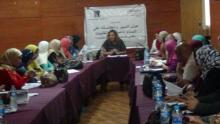
Article Main Image
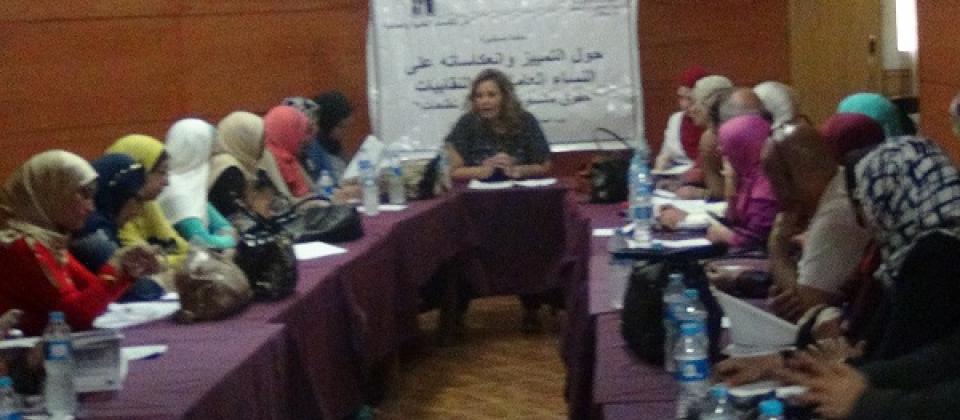
Round Table About Discrimination and Its Reflection on Working and Unionized Women
Round Table About Discrimination
and Its Reflection on Working and Unionized Women
(Equal Rights- Reality and Aspirations)
The Center for Trade Union and Worker Services organized a round table entitled Discrimination
and Its Reflection on Working and Unionized Women (Equal Rights- Reality and Aspirations) in the context of its campaign against discrimination and for the rights of working women “Equal Rights”. It was held on Friday 23/10/2015 in Omaya Hotel at 2 pm. The meeting was attended by 36 workers, union and labour leaders representing the unions of (teachers/ rural guides/ nurses/ post/ engineers/ Faragalla/ the ministry of justice/ journalists/ crafts and drainage/ health sciences/ real estate taxes/ provisions/ NGOs/ agricultural workers) in the governorates of Greater Cairo/ Alexandria/ Suez/ Ismailia/ Qena/ Al Gharbiya / Damietta/ Port Said/ Al Sharkia
The discussions revolved around the issues of discrimination against working and unionized women and its effects on her as one of the main issues that still need more efforts and work. The participants mentioned that coordinating the responsibilities of work and family is a corner stone of women’s work and needs more support for the protection between work and family responsibilities. Balancing between them often forces women to enter the work market and leave it several times during her life losing more space and equality with men not only in terms of social insurance but also in opportunities for learning promotion and advancement. They also mentioned that the cultural conditions often form an obstacle against the advancement of women in the performance of certain jobs and tasks and leads sometimes of discrimination between women and men in some jobs. These conditions force some women to leave work and make do with family life or to work part time.
Discussions took place in this context about the changing the concepts of discrimination and its reflection on working women with regards to the right to work which is a corner stone in achieving equality in society. The attendees asserted that the more the value of equality is asserted in a society and is reflected in the laws that organize work the more society advances forward in achieving social justice, equal opportunities and development. The opposite is also true. The discussions made the suffering of women more clear especially if she is poor or uneducated as she carries several stigma. The stigma of gender, poverty and ignorance, that is the burden of class marginalization in addition to gender based discrimination. Such a situation includes wide sectors of women who suffer from financial need and lack any sort of social protection such as women heads of households and workers in the informal sector who work with out any sort of job insurance and others in women labour sectors. The women are the social strata that are historically most subjected to violations of rights and the ones with the least access to learning and training opportunities and regulated and protected labour market. Besides, she is present in all forms of organizational and institutional frameworks that defend workers rights such as trade unions.
The participants also said that forms of discrimination are a kind of violence against women in work and union related work, the most important among which is:
1. Not providing appropriate working opportunities for women
2. Weakness of the political will seeking to take directives that are more just and equal for women.
3. The condescending view of women’s participation and her work in unions and voicing hurtful and discouraging words by some which result in women avoiding participations
4. The additional burden that the women take on and the hardships of combining family responsibilities and work causing her to be discouraged and avoid any participation so as not to increase such burdens.
5. Most working mothers do not find care for their children such as nurseries and kindergartens and subsequently they increasingly ask for days off or early pardons to leave work putting them under continued scolding by officials and accusations of shortcomings by their colleagues. They therefore refrain from participation in union work.
6. The great distance between work places and the houses of female workers distances them from participation in any activities or events especially when there are not suitable means of transportation.
7. The small number, or lack of, women in decision making positions in administrative departments or unions negatively affects women’s assertion of their rights or enabling them of gaining benefits.
8. Women’s lack of trust in each other and in the role of women negatively affects some of them reaching leading positions because they are not elected and women lose opportunities because of the low level of awareness.
9. Last comes women’s gaining of rights mandated by law such as maternity vacations and lesser working hours during pregnancy and breastfeeding, which makes officials belittle women because they miss work during these periods instead of valuing this role as a socital role, the requirements of which should be borne by the state and society in full. This results in a feeling of frustration and fear of confrontation and refraining for holding leading positions and reaching decision making positions.
The round table concluded that despite all the efforts there still is discrimination in several fields and more effort is still needed to terminate it especially that its negative effects appear clearly on the health and lives of working women and on economic growth and job stability.
The attendees also agreed upon a number of recommendations, interventions and measures needed to improve the conditions of working women in the job market. Their clear vision was that dealing aspects of discrimination and marginalization that the women workers suffer from requires a comprehensive strategy that deals with women labourers in the context of two main issues:
- Women’s rights
- Gender discrimination issues
This discrimination increases in intensity against the weaker links of society especially women. A strategy is needed that depends on an economic, social, political and cultural vision and specifiying clear aims, the formulation of which involves all concerned parties “governmental sectors, the private sector and NGOs”. Roles have to be assigned to all actors in the implementation and follow up of this strategy.

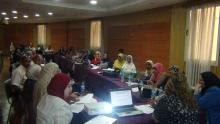
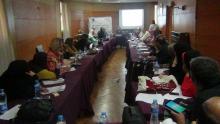
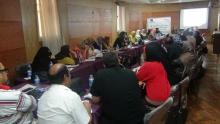
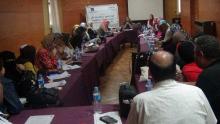
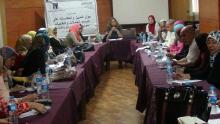
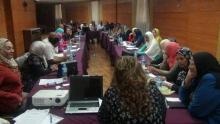
Add new comment